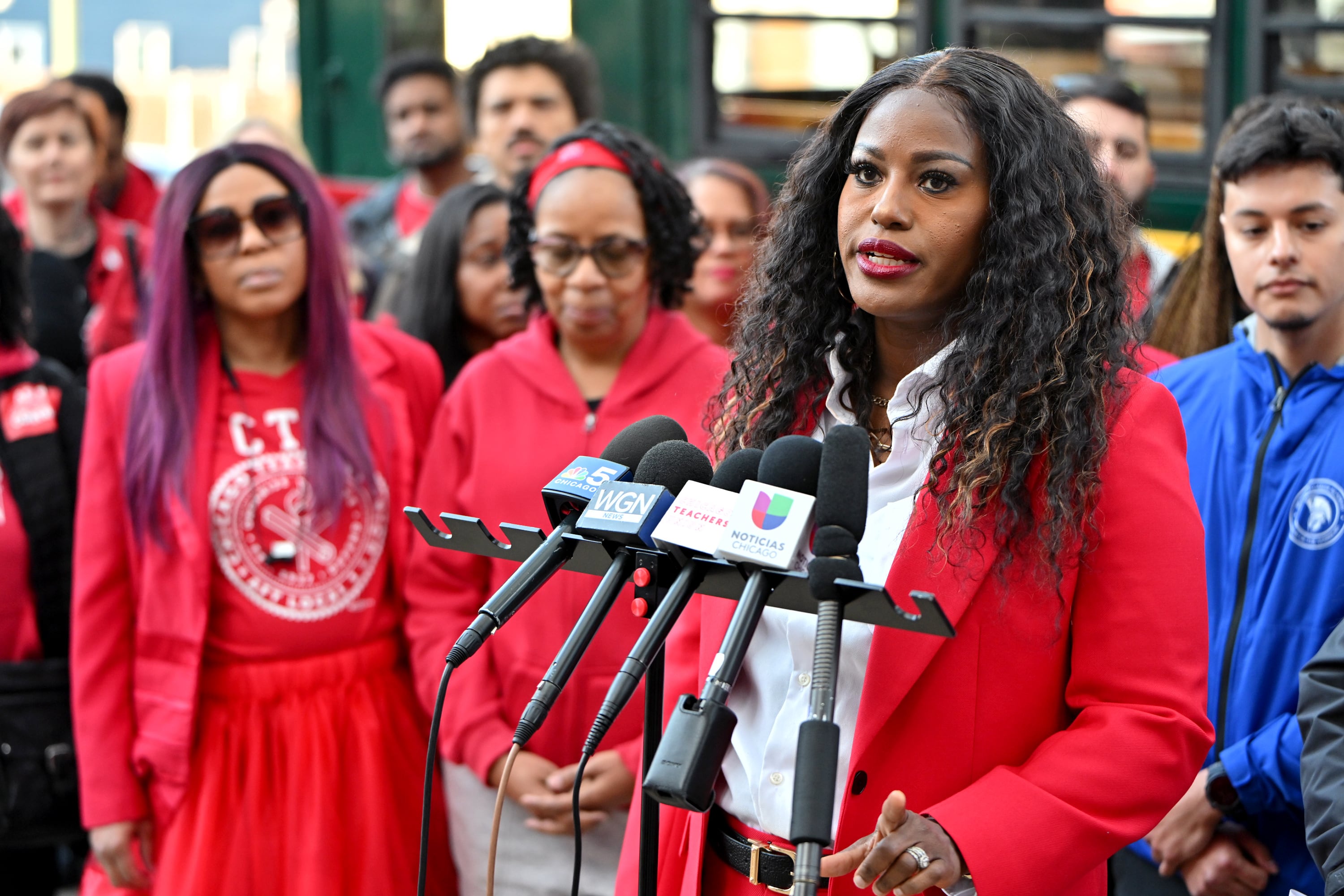Sign up for Chalkbeat Chicago’s free daily newsletter to keep up with the latest education news.
The Chicago Teachers Union wants its next contract to include raising the salary floor for paraprofessionals, more dual language programs, sports and fine arts programs for every school, and more Sustainable Community Schools, which provide wraparound services for students, CTU President Stacy Davis Gates said Tuesday.
The union also wants bargaining sessions to be open to the public, Davis Gates said at a press conference at Richards Career Academy on the Southwest Side, a Sustainable Community School where she was flanked by teachers and other union members.
Davis Gates said having more Sustainable Community Schools is just one area that the union agrees on with Mayor Brandon Johnson, a former middle school teacher and former CTU organizer. That commonality is different from contentious negotiations of the past that led to two strikes, she noted.
That changing dynamic is coupled with the union’s desire to open bargaining sessions up to the broader public, such as through livestream, because the contract is meant to benefit everyone, Davis Gates said.
“When I say that this contract is about the common good, I am saying that in the front yard of this city, we will be inviting families to participate, our students to participate,” Davis Gates said. “We will be inviting Chicagoans who believe that this is the greatest city on Earth, to participate in building the greatest school district on Earth.”
Davis Gates later said that the public sessions can only happen if CPS agrees. A CPS spokesperson said the district “looks forward to learning more” about CTU’s request to publicly bargain. A representative for City Hall did not immediately return a request for comment.
“Although contract talks between CPS and the Chicago Teachers Union (CTU) have not yet commenced, the District looks forward to negotiating a fair contract that balances the interests of the hard working educators with our budget constraints,” said Evan Moore, district spokesperson, in a statement.
There is some precedent. In Colorado, state law requires teachers’ contract negotiations to be done in public. In Chicago, with a union-friendly mayor who drew heavy support from the CTU on the campaign trail, contract negotiations this year may not result in a long battle or lead to a strike, as they have in past years under former mayors Rahm Emanuel and Lori Lightfoot.
However, bargaining will occur as the district is deciding how to close a $391 million budget deficit as federal COVID dollars run out. That challenge raises questions about how many costly demands CPS can commit to.
In an interview last week with Chalkbeat, CPS CEO Pedro Martinez said the district’s structural deficit — when expenses exceed revenue — preceded the pandemic and, in recent years, was due in part to the 2019 CTU contract agreement that will expire this June. Budget watchdogs have noted that this financial situation prevents the mayor from agreeing to every union demand.
Asked about the economic implications of the contract, Davis Gates did not provide more specific details but said the union will ask for “substantial amounts of investment into our school community,” and emphasized that schools still don’t have enough staff.
However, CTU and the district already agree on at least one thing: Both believe the state should provide more funding to CPS to help alleviate its financial pressures and have said they are pushing lawmakers to do so. The state has boosted funding for CPS since overhauling its funding formula in 2017. But that new formula indicates that CPS would still need $1.1 billion to be considered adequately funded.
There are no signs yet that more money is coming. Gov. J.B. Pritzker has proposed a budget that would increase K-12 funding by the same amount as last year.
CTU delivers demands across the city
After the press conference Tuesday, union leaders rode a trolley to deliver its demands to Pritzker’s office, as well as Johnson’s office and some of its critics, such as the Civic Federation, a nonpartisan government watchdog group. The trolley also stopped at the offices of White Sox and Bulls owner Jerry Reinsdorf, who has sought $1 billion in taxpayer subsidies to build a new Sox stadium. Asked why the union approached him, a CTU spokesperson said, “because he loves Chicago as much as we do.”
Before the trolley took off, various school staffers took the microphone at Richards to discuss different contract demands.
Christel Williams-Hayes, the CTU’s recording secretary, highlighted the work of paraprofessionals who provide additional support to schools and can include special education assistants, teacher assistants, school clerks, and parent advocates, among others. The union plans to demand a higher salary floor for paraprofessionals, Davis Gates said. Their pay can range based on the specific paraprofessional job title and years of experience.
One of the lowest paid paraprofessional positions is a teacher assistant, which has a starting salary this school year of $36,259, an increase from $30,862 in the 2019-20 school year, according to the CTU’s current contract.
Charese Munoz, an English teacher at Spencer Technology Academy in Garfield Park, said the city must expand dual language programming to more Black students who can benefit from learning a language other than English.
Rolando Perez, a restorative justice coordinator at Brighton Park Elementary School, which is also a Sustainable Community School, said the union wants “each school and each student” to have a restorative justice coordinator who oversees an alternative form of discipline that focuses on resolving conflicts. The Board of Education recently directed the district to create a new safety plan by removing school resource officers from campuses and implementing alternative disciplinary practices, such as more restorative justice.
“Simply put,” Perez said, “how can a student be ready to learn when they come into a school if they are not feeling fully supported socially and emotionally?”
Reema Amin is a reporter covering Chicago Public Schools. Contact Reema at ramin@chalkbeat.org.






